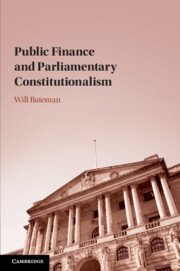Book contents
- Public Finance and Parliamentary Constitutionalism
- Public Finance and Parliamentary Constitutionalism
- Copyright page
- Dedication
- Contents
- Figures
- Preface
- Acknowledgements
- Notes on the Text
- Abbreviations
- 1 Finance and Constitutionalism
- Part I Historical Development of Parliamentary Public Finance
- 2 History (I): Parliament and Executive
- 3 History (II): Judiciary
- 4 History (III): Exporting Parliamentary Public Finance
- 5 History (IV): Public Finance in the Modern State
- Part II Parliamentary Public Finance in Operation
- Part III Evaluating Parliamentary Public Finance
- Bibliography
- Index
2 - History (I): Parliament and Executive
from Part I - Historical Development of Parliamentary Public Finance
Published online by Cambridge University Press: 16 September 2020
- Public Finance and Parliamentary Constitutionalism
- Public Finance and Parliamentary Constitutionalism
- Copyright page
- Dedication
- Contents
- Figures
- Preface
- Acknowledgements
- Notes on the Text
- Abbreviations
- 1 Finance and Constitutionalism
- Part I Historical Development of Parliamentary Public Finance
- 2 History (I): Parliament and Executive
- 3 History (II): Judiciary
- 4 History (III): Exporting Parliamentary Public Finance
- 5 History (IV): Public Finance in the Modern State
- Part II Parliamentary Public Finance in Operation
- Part III Evaluating Parliamentary Public Finance
- Bibliography
- Index
Summary
This chapter explains how a distinct constitutional model of public finance developed in the UK between 1700 and 1900, focusing on the legal and institutional relationship between Parliament and the Treasury. After providing critical economic context regarding the financial activities of British governments, the chapter explains how the complex inter-play of taxation and appropriation legislation distributed financial authority between parliament and executive government. It then moves to survey the growth of statutory public borrowing, the law underpinning the Bank of England's public financing functions, the appointment of the Treasury at the financial apex of Westminster government and the growth of a settled system of public audit. Special attention is paid to a number of topics: appropriation legislation (annual and standing); time-limited taxation statutes; the Treasury's power to adjust parliament's approved expenditure (virement); the connection between annual appropriation legislation and the UK's 'National Debt'; the Bank of England's powers to finance government; and the complicated relationship between Treasury and Comptroller and Auditor-General.
Keywords
- Type
- Chapter
- Information
- Public Finance and Parliamentary Constitutionalism , pp. 23 - 62Publisher: Cambridge University PressPrint publication year: 2020

